| Listing 1 - 10 of 14 | << page >> |
Sort by
|
Book
ISBN: 2846210314 Year: 2003 Publisher: Paris : Editions de Paris,
Abstract | Keywords | Export | Availability | Bookmark
 Loading...
Loading...Choose an application
- Reference Manager
- EndNote
- RefWorks (Direct export to RefWorks)
Protestant women --- Feminism --- Protestantes --- Féminisme --- History --- History. --- Histoire
Book
Year: 1992 Publisher: Berlin : Morgenlandische Frauenmission,
Abstract | Keywords | Export | Availability | Bookmark
 Loading...
Loading...Choose an application
- Reference Manager
- EndNote
- RefWorks (Direct export to RefWorks)
Protestant women --- Women missionaries --- Protestantes --- Femmes missionnaires $z Allemagne
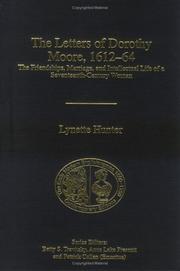
Abstract | Keywords | Export | Availability | Bookmark
 Loading...
Loading...Choose an application
- Reference Manager
- EndNote
- RefWorks (Direct export to RefWorks)
Moore, Dorothy --- Correspondence --- Protestant women --- England --- Christian women --- Moore, Dorothy, --- Dury, Dorothy,
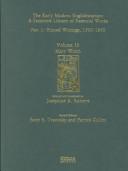
ISBN: 1859280927 9781859280928 Year: 1996 Publisher: Aldershot (England): Scholars Press,
Abstract | Keywords | Export | Availability | Bookmark
 Loading...
Loading...Choose an application
- Reference Manager
- EndNote
- RefWorks (Direct export to RefWorks)
Protestant women --- Christian women martyrs --- Protestants --- Christian martyrs --- Askew, Anne, - 1521-1546.
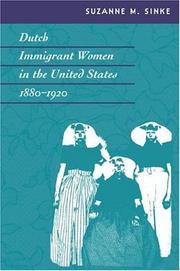
ISBN: 0252027310 Year: 2002 Publisher: Urbana (Ill.) : University of Illinois press,
Abstract | Keywords | Export | Availability | Bookmark
 Loading...
Loading...Choose an application
- Reference Manager
- EndNote
- RefWorks (Direct export to RefWorks)
Dutch American women --- Immigrants --- Protestant women --- Sex role --- Social conditions --- History
Book
ISBN: 0522869912 Year: 2017 Publisher: Carlton, Vic.: MUP Academic Digital,
Abstract | Keywords | Export | Availability | Bookmark
 Loading...
Loading...Choose an application
- Reference Manager
- EndNote
- RefWorks (Direct export to RefWorks)
After successfully agitating for the vote for women from the 1890s, Protestant women's organisations in Australia began to educate women at a grassroots level on effective ways of applying political pressure on a wide range of topics and social concerns. These organisations sought to agitate on a wide range of issues related to girls and women, connecting with public anxieties and highlighting particular vulnerabilities of girls and young women who lived alone in the city and had the potential to be exploited in the workforce. By the 1920s and 1930s these women's groups noted with concern the easier access to divorce and birth control in the Soviet Union and the growing influence of both Communism and 'Hitlerism' in galvanising young people. Agitate, Educate, Organise, Legislate explores the colourful debates and anxieties that were prevalent from the 1890s to the 1930s and the responses of the key women's organisations whose leadership and campaigns acknowledged that--outside of parliament and party politics--women's connection to political matters could be both innovative and socially influential.
Protestant women --- Social action --- Women --- Women --- History. --- History. --- Social conditions --- Social conditions
Book
ISBN: 0773430288 9780773430280 9780773437876 0773437878 Year: 2010 Publisher: Lewiston Edwin Mellen Press
Abstract | Keywords | Export | Availability | Bookmark
 Loading...
Loading...Choose an application
- Reference Manager
- EndNote
- RefWorks (Direct export to RefWorks)
This study is unique in that it analyzes the attitudes of a female sample stratified according to religious tradition (Catholic/Protestant). The sample was also stratified by age (21-45/46-70 years) and location (rural/urban). Irish sociological, social psychological and feminist scholarship has produced diverse work concerning many facets of Irish women's lives, but little research has specifically focused on the attitudes of Irish Protestant and Catholic women as distinct groups.
Catholic women -- Ireland. --- Protestant women -- Ireland. --- Women -- Ireland. --- Women --- Protestant women --- Catholic women --- Gender & Ethnic Studies --- Social Sciences --- Gender Studies & Sexuality --- Christian women --- Human females --- Wimmin --- Woman --- Womon --- Womyn --- Females --- Human beings --- Femininity --- Women, Catholic
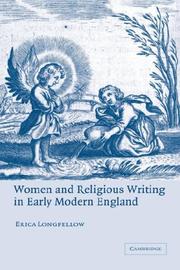
ISBN: 0521837588 9780521100403 9780511483707 9780521837583 0511230621 9780511230622 0511229003 9780511229008 0511229844 9780511229848 9780511231391 0511231393 0511483708 1280703148 9781280703140 1107161754 9781107161757 0511327366 9780511327360 0521100402 Year: 2008 Publisher: Cambridge Cambridge University Press
Abstract | Keywords | Export | Availability | Bookmark
 Loading...
Loading...Choose an application
- Reference Manager
- EndNote
- RefWorks (Direct export to RefWorks)
This study challenges critical assumptions about the role of religion in shaping women's experiences of authorship. Feminist critics have frequently been uncomfortable with the fact that conservative religious beliefs created opportunities for women to write with independent agency. The seventeenth-century Protestant women discussed in this book range across the religio-political and social spectrums and yet all display an affinity with modern feminist theologians. Rather than being victims of a patriarchal gender ideology, Lady Anne Southwell, Anna Trapnel and Lucy Hutchinson, among others, were both active negotiators of gender and active participants in wider theological debates. By placing women's religious writing in a broad theological and socio-political context, Erica Longfellow challenges traditional critical assumptions about the role of gender in shaping religion and politics and the role of women in defining gender and thus influencing religion and politics.
Thematology --- English literature --- anno 1600-1699 --- Christian poetry, English --- Christianity and literature --- Women and literature --- Christian literature, English --- Protestant women --- Christian women --- History and criticism. --- History --- Protestant authors --- Women authors --- Intellectual life. --- Arts and Humanities --- Literature
Book
ISBN: 1282620703 9786612620706 1846156815 1843833654 Year: 2008 Publisher: Woodbridge ; Rochester, NY : Boydell,
Abstract | Keywords | Export | Availability | Bookmark
 Loading...
Loading...Choose an application
- Reference Manager
- EndNote
- RefWorks (Direct export to RefWorks)
A study of one of the most influential women of her day has much to reveal about the developments which shaped the English Reformation. Katherine Willoughby, duchess of Suffolk, was one of the highest-ranking noblewomen in sixteenth-century England. She wielded considerable political power in her local community and at court, and her social status and her commitment to religious reform placed her at the centre of the political and religious developments that shaped the English Reformation. By focusing on her kinship and patronage network, this book offers an examination of the developmentof Protestantism in the governing classes during the period. It begins by looking at the process through which Willoughby and her associates embraced reform, arguing that the spread of Protestantism among the political elite was an intermittent and complex process shaped in part by myriad kinship and patronage relationships: Willoughby and her godly associates played a crucial role in encouraging religious change in Lincolnshire through their patronage ofreformers and their support of a variety of domestic, educational, and religious institutions. It also demonstrates the importance of gender in the process of spiritual transformation, and shows how the changing religious climateprovided new opportunities for women to exert greater influence in their society. MELISSA FRANKLIN HARKRIDER is Assistant Professor of History, Wheaton College.
Women social reformers --- Protestant women --- Protestantism --- Church and social problems --- History --- Protestant churches. --- Suffolk, Katharine Willoughby Brandon, --- Great Britain --- Church history --- Christianity --- Protestant churches --- Reformation --- Christian women --- Social reformers --- Bertie, Catharine, --- Brandon, Katharine Willoughby, --- Suffolk, --- Willoughby, Katharine, --- Willoughby, Katherine,
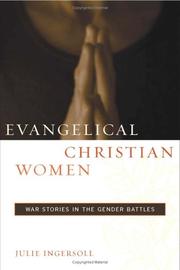
ISBN: 0814737749 0814737757 1417568607 9780814737750 9781417568604 9780814737705 0814737706 9780814737699 0814737692 9780814737743 Year: 2003 Publisher: New York : New York University Press,
Abstract | Keywords | Export | Availability | Bookmark
 Loading...
Loading...Choose an application
- Reference Manager
- EndNote
- RefWorks (Direct export to RefWorks)
Evangelical Christian Women draws on two years of ethnographic research nationwide to shed new light on the gender conflict faced by women in evangelical Christianity. Julie Ingersoll goes beyond previous attempts to find avenues of empowerment for fundamentalist women to offer a more nuanced look at the challenges they face when they occupy positions of leadership which violate traditional gender norms. She looks where other studies do not-at women who, while remaining entrenched in and committed to evangelical Christianity, are also resisting accepted gender roles. Evangelical Christian Wome
Evangelicalism --- Protestant women --- Sex role --- Women in fundamentalist churches --- Christian women --- Gender role --- Sex (Psychology) --- Sex differences (Psychology) --- Social role --- Gender expression --- Sexism --- Fundamentalist churches --- History --- Religious aspects --- Christianity --- History of doctrines --- Gender roles --- Gendered role --- Gendered roles --- Role, Gender --- Role, Gendered --- Role, Sex --- Roles, Gender --- Roles, Gendered --- Roles, Sex --- Sex roles
| Listing 1 - 10 of 14 | << page >> |
Sort by
|

 Search
Search Feedback
Feedback About UniCat
About UniCat  Help
Help News
News